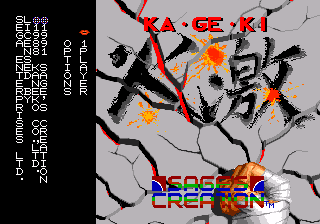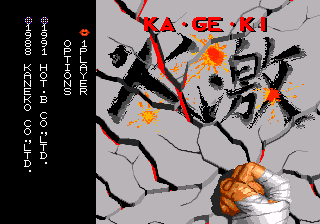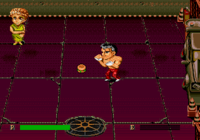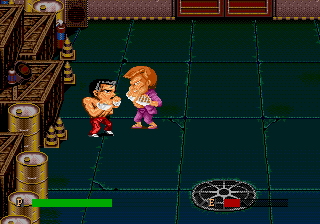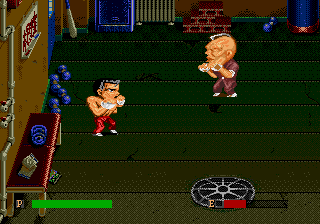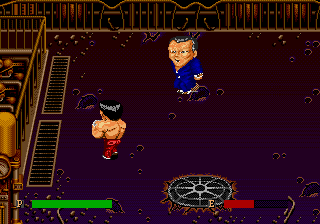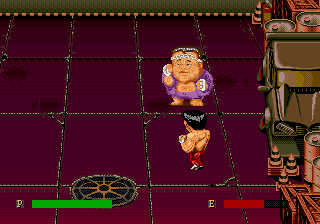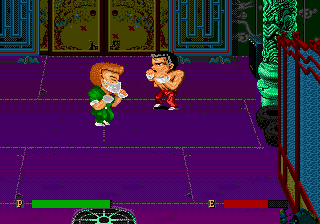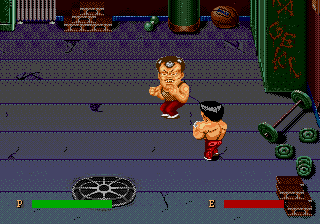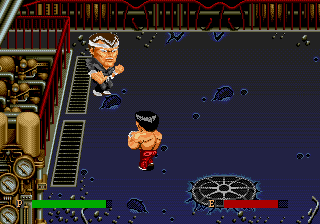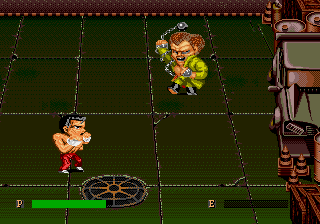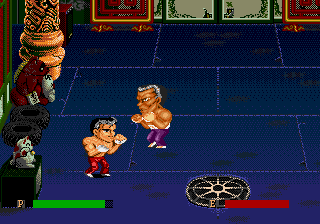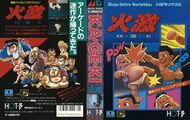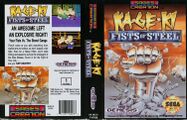Ka-Ge-Ki
From Sega Retro
| |||||||||||||||
| Ka-Ge-Ki | |||||||||||||||
|---|---|---|---|---|---|---|---|---|---|---|---|---|---|---|---|
| System(s): Sega Mega Drive | |||||||||||||||
| Publisher: HOT-B (Japan), Sage's Creation (US) | |||||||||||||||
| Developer: Kaneko, Mecano Associates (music, sound) | |||||||||||||||
| Original system(s): Arcade boards | |||||||||||||||
| Genre: Action[1][2] | |||||||||||||||
| Number of players: 1 | |||||||||||||||
| Official in-game languages: | |||||||||||||||
| |||||||||||||||
|
Ka-Ge-Ki (火激), sold as Ka-Ge-Ki: Fists of Steel in the US, is a 1991 action game developed by HOT-B for the Sega Mega Drive. It was ported from a 1988 arcade game, developed by Kaneko and released by Taito.
Contents
Story
The criminal organization known as Ka-Ge-Ki is trying to recruit the former professional boxer Kei. He refuses, which angers the Boss, who sends his underlings to beat up Kei's brother. Kei decides to infiltrate the Ka-Ge-Ki headquarters, an abandoned building in a rundown neighborhood, and confront the Boss.
Gameplay
The game is a beat-'em-up. The player controls Kei, a former champion boxer, and fights through nine rounds, represented as separate floors of a building. In each round, the goal is to defeat a certain number of enemies that attack the player one at a time. The number of enemies that appear is based on the stage and difficulty level. After enough opponents are beaten, a boss appears. After the boss is defeated, gameplay continues on the next floor until the final boss is fought on the ninth floor.
Fights take place in a small, square arena, where Kei is free to move in any direction using the D-Pad. Kei and the enemy can move in eight directions and always face each other, and they can attack each other at four different angles. Kei can attack enemies using a fast jab with ![]() or a straight punch with
or a straight punch with ![]() . He can jump with
. He can jump with ![]() or duck with
or duck with ![]() +
+![]() to avoid enemy attacks. The straight punch usually has a slow recovery time, but it can be canceled by ducking in order to recover immediately.
to avoid enemy attacks. The straight punch usually has a slow recovery time, but it can be canceled by ducking in order to recover immediately.
Fighters can be knocked down if they are hit too many times. An audience cheers or boos during the fight. Each fighter has limited health, and the fighter is defeated when his health runs out (with a referee coming to count him out). Kei has more health than most of his opponents, but it is not restored in between rounds. When Kei is defeated, the game ends, but it can be continued if the player has credits left. For the first five rounds, the game is continued from the last played round. For rounds 6 and 7, the game is continued from round 6. For rounds 8 and 9, the game is continued from round 8.
There are three difficulty levels (Easy, Normal, and Hard), which affect how much damage enemies do. The player can also adjust the starting health (32 or 40), the starting round (1, 2, or 3), and the number of continues (3, 6, or 9).
Items
Occasionally, a "Mystery Lady" appears to throw a power-up into the arena, which can be collected by walking over it.
| Glove | |
|---|---|
| Allows Kei to jab at a faster rate for a duration. | |
| Hamburger | |
| Restores 10 points of health. | |
| Canned Food | |
| Restores 20 points of health. |
Rounds
| Garage | |
|---|---|
|
Boss: O'Casey | |
| Gym | |
|
Boss: Picker | |
| Machine Room | |
|
Boss: Lizard | |
| Empty Room | |
|
Boss: Ashpit | |
| Former Night Club | |
|
Boss: Maskit | |
| Fitness Club | |
|
Boss: Slick | |
| Round 7 | |
|
Boss: Spike | |
| Round 8 | |
|
Boss: Weirdo | |
| Round 9 | |
|
Boss: The Boss | |
Versions
Voice data is different between the Japanese and US releases.
Compared to the Arcade version, there are some significant differences, making this version an arranged version rather than a straight port. The game takes place in a building with changing backgrounds while the original was located at a harbor with a single background. There are no longer gang members sitting in the background, though their cheering and booing remains. Enemies take more damage, and weaker mob enemies where added, possibly to extend the game's length. There are some color indexing mistakes, causing certain characters to have the wrong shade graduations as a result.
Production credits
- Screenplay: One Two Diamond
- Programming: Mr. Nagaya, Cube and Toda
- Graphic Design: Mike Yorozuya, Motor Gunma
- Music Composed by: Kaneko Co., Ltd., Mecano Associates
- Music Arranged by: Mecano Associates
- Sound Design: M.Suzuki
- Directed by: Professor Banban
- Produced by: Dramatic a Go Go
- Presented by: Sage's Creation
Magazine articles
- Main article: Ka-Ge-Ki/Magazine articles.
Promotional material
- Main article: Ka-Ge-Ki/Promotional material.
Physical scans
| ExpandSega Retro Average |
|---|
| 47 | |
|---|---|
| Based on 22 reviews | |
Technical information
- Main article: Ka-Ge-Ki/Technical information.
References
- ↑ File:KaGeKi MD JP Box.jpg
- ↑ Jump up to: 2.0 2.1 https://sega.jp/history/hard/megadrive/software_l.html (Wayback Machine: 2020-07-02 23:21)
- ↑ Beep! MegaDrive, "September 1990" (JP; 1990-08-XX), page 7
- ↑ GamePro, "June 1991" (US; 1991-xx-xx), page 40
- ↑ File:Ka-Ge-Ki MD credits.pdf
- ↑ 1700 igr dlya Sega, "" (RU; 2001-xx-xx), page 155
- ↑ ACE, "August 1991" (UK; 1991-07-08), page 64
- ↑ ACE, "December 1991" (UK; 1991-11-08), page 118
- ↑ Beep! MegaDrive, "April 1991" (JP; 1991-03-08), page 30
- ↑ Famitsu, "" (JP; 1991-0x-xx), page 1
- ↑ Games-X, "31st May 1991" (UK; 1991-05-24), page 37
- ↑ Hippon Super, "April 1991" (JP; 1991-03-04), page 42
- ↑ Joystick, "Juin 1991" (FR; 1991-0x-xx), page 130
- ↑ Sega Mega Drive Advanced Gaming, "November 1992" (UK; 1992-xx-xx), page 79
- ↑ Sega Mega Drive Advanced Gaming, "January 1993" (UK; 199x-xx-xx), page 92
- ↑ Mega Drive Fan, "July 1991" (JP; 1991-06-08), page 85
- ↑ Mega, "December 1993" (UK; 1993-11-18), page 77
- ↑ MegaTech, "Xmas 1991" (UK; 1991-12-06), page 78
- ↑ Power Play, "8/91" (DE; 1991-07-1x), page 120
- ↑ Raze, "August 1991" (UK; 1991-06-27), page 61
- ↑ Sega Power, "October 1991" (UK; 1991-09-05), page 53
- ↑ Sega Pro, "April 1993" (UK; 1993-03-11), page 66
- ↑ Sega Force, "June 1993" (UK; 1993-05-06), page 78
- ↑ Sega Saturn Magazine, "September 1995" (JP; 1995-08-08), page 87
- ↑ Tilt, "Septembre 1991" (FR; 1991-09-xx), page 82
- ↑ Tricks 16 bit, "Tricks Sega Gold 800 igr" (RU; 1998-03-20), page 100
- ↑ VideoGames & Computer Entertainment, "November 1990" (US; 1990-1x-xx), page 58
| CollapseKa-Ge-Ki | |
|---|---|
|
Main page | Comparisons | Magazine articles | Reception | Promotional material | Region coding | Technical information | Bootlegs | |
